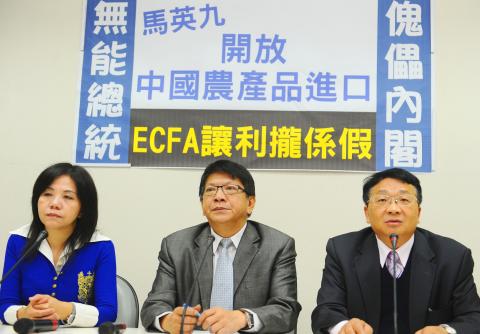|
DPP slams Ma for approving more
imports
By Chen Ching-min and Jason Pan / Staff reporter, with Staff
writer

Democratic Progressive Party (DPP)
Legislator Chen Ou-po, far right, accompanied by DPP Legislator Yeh Yi-jin,
left, and DPP caucus whip Pan Men-an, speaks during a press conference at the
Legislative Yuan in Taipei yesterday.
Photo: Chang Chia-ming, Taipei Times
The Democratic Progressive Party (DPP)
caucus yesterday criticized the government for approving more Chinese
agricultural products to be imported, “under the pretext that this is in
Taiwan’s best interest,” saying that if this policy is followed through, it
would be the “death knell for Taiwanese farmers” and will become a “hallmark of
shame” for President Ma Ying-jeou (馬英九).
DPP caucus whip Pan Men-an (潘孟安) said the party would organize street rallies
with farmers to protest the policy of allowing more imports from China.
“In the past four years, the Ma administration has permitted agricultural
products from China to enter our market through intermediary trading and through
special import licensing permits. These imports have also included processed
agricultural goods. All this shows Ma has been lying to the public,” Pan said.
Pan said Chinese Minister of Commerce Chen Deming (陳德銘) on Nov. 9 asked the
government to open up the Taiwanese market to more Chinese agricultural
products, with some categories competing against Taiwan’s domestically produced
agricultural goods.
“Ma said in an interview on Tuesday that some farmers were asking the government
to open up the market to Chinese agricultural goods that are cheaper than those
from other countries. Ma even chided the Council of Agriculture for taking time
to deliberate on the matter,” he said.
“Ma is the president of this country. He is not the head of a special
administrative area appointed by China. But he is complying with the requests
from the Chinese minister of commerce. This is a big joke for all the world to
see,” Pan said.
He added that Ma last year praised one of the derived benefits of the Economic
Cooperation Framework Agreement (ECFA), when Taiwanese grouper fish were sold in
China.
“However, the price of grouper has declined sharply, and now we need to import
grouper fry from China to restock the Taiwanese market,” Pan said,
“Taiwan’s agricultural technology was transplanted to China and is now
destroyed. It is a big tragedy. Our party will protest vigorously against the Ma
administration for ruining the nation’s agricultural sector, which has been
fundamental to our country’s economy. Now it has become the way of the high-tech
sector, that, after moving most of their manufacturing to China, companies are
returning to Taiwan, dumping cheaply produced goods into our market,” he said.
DPP Legislator Yeh Yi-jin (葉宜津) said Beijing had found that fighting Taiwan
militarily was too costly and has decided it would be cheaper to “buy up” Taiwan
instead.
“China has its propaganda machine running, signing contracts to purchase
agricultural products from Taiwanese farmers. If they suddenly stop purchasing,
and farmers end up with a surplus, who will be responsible?” she asked.
Yeh said the Ma government was permitting China to conduct its propaganda
campaign against Taiwanese, which is akin to the proverbial frog being cooked.
“Who gets all the real benefits under ECFA? When China has met its political
goals, it will not just affect Taiwan’s agricultural sector, it will also impact
on how our government is managed, which would include the subsidies given to
farmers under the Agricultural Development Fund,” Yeh said.
DPP Legislator Chen Ou-po (陳歐珀) said that opening the market to Chinese
agricultural products would be “the last straw” that breaks the backs of
Taiwanese farmers.
“In his second-term inauguration address, Ma Ying-jeou reiterated that there was
no plan to open up the Taiwan market, so he must stick to this promise. If he
does not, farmers will take to the streets to protest,” Chen said.
“The benefits of ECFA are nothing but deceit,” DPP Legislator Ho Hsin-chun (何欣純)
said.
She said Ma announced the plan to reduce trade tariffs would benefit Taiwan by
US$9 billion each year.
However from January to October this year, the reduction in tariffs for
Taiwanese goods exported to China amounted to just US$445 million, and the total
from last year to October this year amounted to just US$572 million, less than
one-tenth of what Ma had promised.
DPP caucus secretary-general Tsai Chi-chang (蔡其昌) said that, before the
presidential election, Ma vowed not to allow more imports of Chinese
agricultural products, but now used the pretext of “Taiwan’s best interest” to
“open up our market to virtually anything.”
|
![]()
![]()
![]()